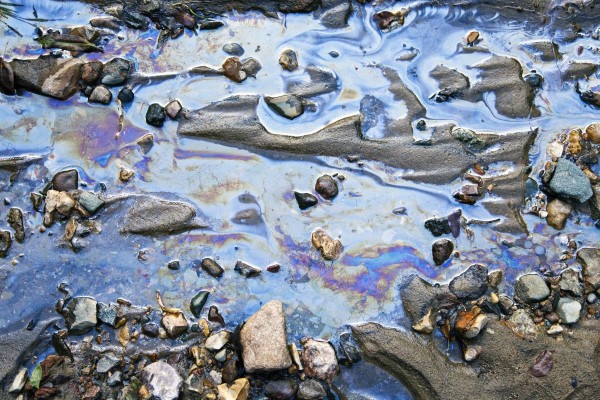
Advertisement
A North Dakota pipeline spill has released many tens of thousands of gallons of crude oil into a nearby creek, just two and a half hours away from Cannon Ball, ND, where activists have been protesting the construction of the Dakota Access Pipeline for months.
Members of the Standing Rock Sioux tribe, their allies and environmentalists from around the country, have been speaking out against the pipeline. They have rallied together to fight against it on the grounds that it crosses under a lake that provides drinking water to Native Americans. Activists maintain that routing the pipeline under Lake Oahe puts the water source in jeopardy and could destroy sacred land. This latest incident is surely not going to inspire any confidence among the pipeline’s detractors.
Officials from the state of North Dakota say that an estimated 176,000 gallons of crude oil spilled from the Belle Fourche pipeline and into Ash Coulee Creek. Bill Suess, a state environmental scientist, says the spill was discovered near the city of Belfield on December 5 by a landowner. Belfield is approximately 150 miles from the core of the Dakota Access Pipeline protest camps.
Wendy Owen, a spokeswoman for Casper, Wyoming-based True Companies, which operates the Belle Fourche pipeline, told CNBC that they had the spill contained within just a matter of hours. Owen also told the Associated Press that it was not yet clear why the electronic monitoring equipment failed to detect the spill.
Owen says that the pipeline was shut down as soon as the spill was discovered, and suggested that their current number-one theory is that the “hillside sloughed” and inevitably caused the pipeline to rupture. She notes that there are several other plausible theories and that the investigation is still ongoing.

The spill has contaminated 5.4 miles of land surrounding Ash Coulee Creek, but Suess says that it does not appear that the spill reached the Little Missouri River. Of the approximately 4,200 barrels of oil spilled, only about 983 barrels (or 41,286 gallons) had been recovered as of Monday. In other words, they’ve still got a lot of cleaning up to do.
Following the death of two cows, crews have been assisting in moving cattle away from the contaminated creek and have been trucking in clean water. Wendy Owens noted that both privately owned land and land owned by the US National Forest Service was affected by the spill.
Sixty clean-up workers were on-site cleaning up the disaster on Monday. According to Suess, they are cleaning up about 100 yards of land per day. While the creek was free-flowing when the spill was discovered, it has since frozen over. Oil remains trapped in the frozen creek.
When the spill started, and how long it went on for before being discovered, are not yet known. Kevin Connors, pipelines program supervisor for the North Dakota Oil and Gas Division, maintains that the pipeline, which was built sometime in the 1980s, was outfitted with pressure gauges and meters to monitor for leaks. It appears that there was some kind of failure in the monitoring system, as the leak went unnoticed until being discovered by the landowner. According to Connors, the company does aerial inspections twice a month.
True Companies reportedly operates at least three pipeline companies in Montana, North Dakota and Wyoming. The company has a history of spills. Just last year, in January 2015, one of their pipelines broke and spilled 30,000 gallons of oil into the Yellowstone River. The spill temporarily shut down the water supply for the downstream community of Glendive, Montana, after oil was detected in the town’s water treatment system.
In just 10 years, the subsidiaries of True Companies have reported a staggering 36 oil spills that add up to 320,000 gallons of product released. Most of it was never recovered. If we were to average this, that means the company spills between 8,000 and 10,667 gallons of oil every three to four months.
Sources:
Submit a correction >>
This article may contain statements that reflect the opinion of the author
Advertisement
Advertisements















